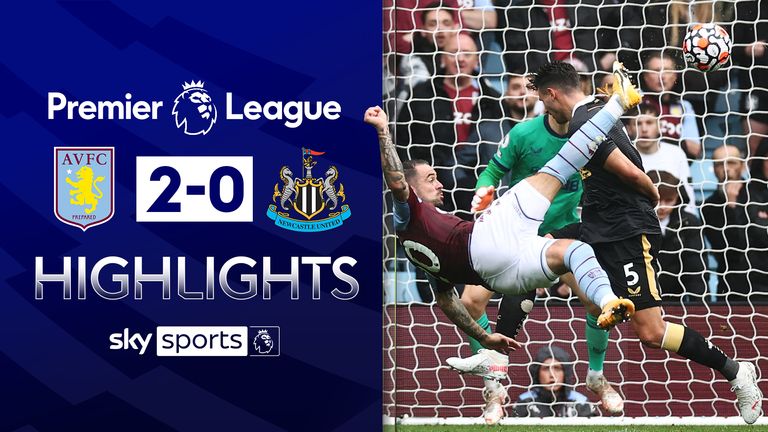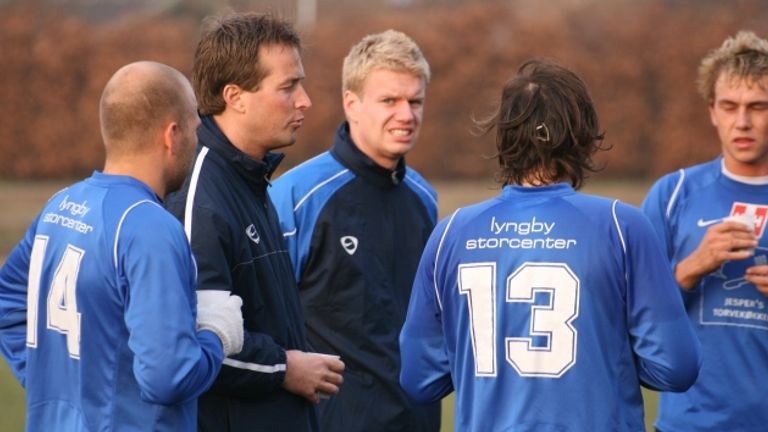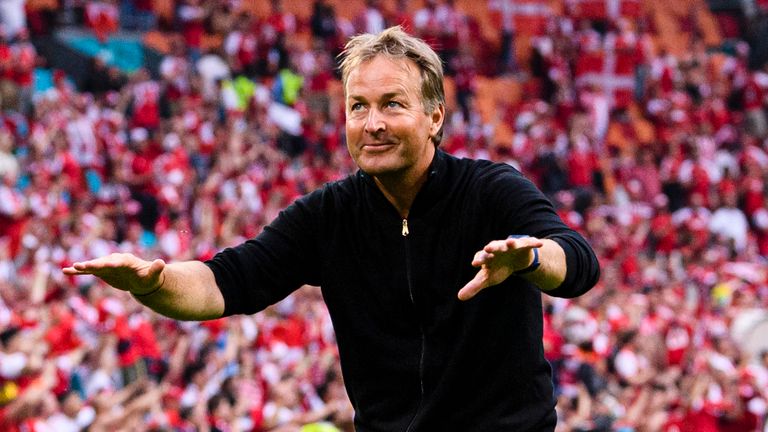Thomas Frank and Johan Lange's path from Lyngby to the Premier League
Thomas Frank is already winning new admirers with Brentford enjoying the start of their Premier League adventure. On Saturday, he will meet up with compatriot Johan Lange at Aston Villa, the sporting director who has been busier than most this summer.
But while overseeing a British transfer record sale might merit a mention when they catch up, it is more likely that memories of an earlier time will be shared. These two Danes used to share a small office together back when they were coaching at Lyngby.
Two decades on, Birger Jorgensen, the man who hired them both, is still at that club in the suburbs of Copenhagen. He is relatively relaxed about the sums involved in the Jack Grealish sale. “Only the figures and the currency are different,” he tells Sky Sports.
But Jorgensen, their old sporting director, is full of admiration for how his recruits have found their way to the Premier League. Although they began that journey together, he recalls two very different characters, the charismatic Frank and the analytical Lange.
“Thomas is Thomas, he walks the talk. He has always been the same and will always be the same. He is very hardworking and always in a good mood. Johan is the opposite of Thomas, he keeps his cards close to his chest. But he is a fantastic guy, very smart.”
Trending
If only Frank and Lange had emerged from Lyngby, it would be a mere quirk. But they were not alone. While they held backroom roles within the academy and reserve team, respectively, the U19 coach was Niels Frederiksen. He has just won the title with Brondby.
The first-team coach at the time was Kasper Hjulmand, one of the stars of the Euro 2020 summer in guiding Denmark to the semi-finals of the tournament, before being edged out by England. “He lost to that ‘not penalty’ at Wembley,” recalls Jorgensen.
“They all had great success this year. It is satisfying that I hired them all.”
Please use Chrome browser for a more accessible video player
Jorgensen met Hjulmand on a course in 1998, soon bringing him in as an individual coach in the academy, a role that was subsidised by the Danish federation at the country’s top clubs. In 2002, Hjulmand became first-team coach and Frank took over that individual role.
It is not unusual for coaching schools to develop, of course. What is perhaps a bit different about this group of Danes is that they have not necessarily lifted each other up. Since leaving Lyngby each has taken his own path but all have enjoyed success.
“We call and text each other, but we are not that close regarding jobs. Actually, we are opponents for jobs, me and Johan. Of course, Thomas, Kasper and Niels are coaching so they are opponents for jobs too. Everyone has had to take care of themselves.
“But I think we all have a common thing, we all believe in ourselves, we all know where we are coming from and none of us think we are something we are not. That is what has made us successful, good people who are working hard, being themselves.”
Please use Chrome browser for a more accessible video player
But there must have been something a little special about Lyngby?
“Lyngby is just an ordinary football club but we have a special environment. We are built on curious coaching. You can experiment here. Of course, we try to win our games and be champions. But we are always collecting good people, hard-working people.”
- Get Sky Sports | Live football on Sky Sports
- Stream the biggest moments on NOW for just £25 p/m
Individuals, too. An environment in which characters as different as Frank and Lange can flourish must surely have be open to the exchange of ideas, people doing it their own way.
“A lot of clubs believe only in serious people but you need a bit of yourself, a bit of a social life. A football club is about teamwork, otherwise it cannot exist. That is why so many former Lyngby coaches are so successful. We are happy about it and want it to continue.”
Together in that office at Lyngby, ideas were shared. “It was good people, good coaches, a good environment.” Through discussion, Hjulmand began to expand on the beliefs that not only helped Lyngby but sparked a sea change in youth coaching in Denmark.
“When Kasper was at Lyngby, he decided to work together with Keld Bordinggard on changing youth football from the age of 12 to 15,” explains Jorgensen.
“They focused on the younger generation of players, not selecting them too early, focusing on smaller-sided games, keeping together as many players as possible because nobody knows who will come through with the big talent.
“It seems very easy to run a football club like this but at the end of the day it is very complicated because there are so many stakeholders around youngsters today.
“Some of the players that are very successful in our academy later on when they are 15, 16, 17, 18 or 19, through to the first team, that is because Kasper was at our club in 2002.
“Twenty years later we are benefiting from that.”
Earlier this year, Denmark moved back into the top ten of the FIFA rankings. Lyngby’s influence is still being felt. “In the Danish national youth section, the U16 coach, the U17 coach and the U19 coach are all former Lyngby coaches.”
They are the future of Danish football, while Jorgensen insists there is another wave of coaches at Lyngby capable of ensuring the culture continues. In the present, there is Frank and Lange preparing for their teams to face off in the world’s richest league.
Jorgensen hopes to attend the game.
“If Boris Johnson lets me in,” he says, referring to the travel restrictions that make a visit to Villa Park tricky. “I have spoken to Johan and Thomas. If things change I will be there.”
Even if he cannot do so, thoughts will turn to the long journey that began at Lyngby.
“I spotted them, I hired them, I worked with them. But they have done it themselves. They have taken their chance. We are just happy to have been a part of their education.”
Source: Read Full Article




